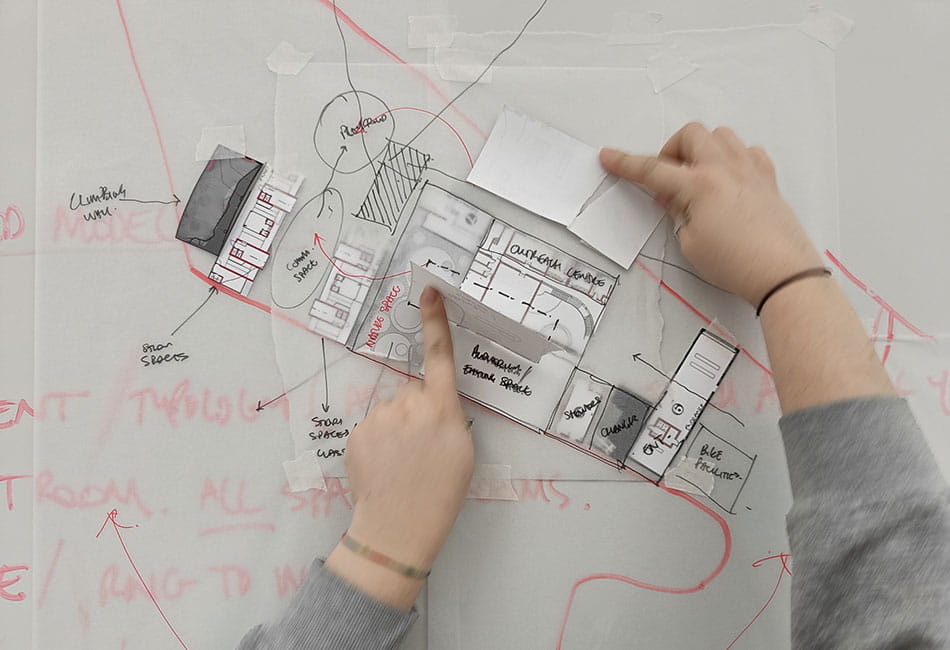
Higher/Degree Apprenticeship Architect
MArch Architecture and PGCert Professional Practice, Knowledge, Skills and Management in Architecture
Please note; the deadline for January 2025 applications has now passed.
About
Our Architect apprenticeship will give you the master's level expertise and qualifications you need to become a qualified architect. You'll benefit from industry-experienced teachers, live briefs, field trips, workshops and real-world projects.
Why study for an Architect apprenticeship?
Our Architect apprenticeship draws on UWE Bristol's significant strengths in architecture education and our experience of supporting students through our postgraduate architecture courses. This training route enables you to complete the next stage of your professional development, investing in your training while continuing to work.
Our Architect apprenticeship (Level 7) starts in September. Over four years, you'll gain the training and specialist skills needed to achieve Part II and III qualifications, with tuition funded through the apprenticeship funding system.
Develop your skills in architectural design and construction, client contact and the operational side of running an architectural practice through this employer-funded training option, progressing your career.
Why UWE Bristol?
UWE Bristol has an excellent reputation for its architecture courses and the calibre of its graduates. The department also has a strong reputation for design research teaching, with relevant exhibitions and symposia integrated within our postgraduate architecture courses, including the Architect apprenticeship.
This apprenticeship incorporates our strengths in sustainability, reflective professional practice, architectural design, design research and enquiry, construction contract law, teaching about professional practice and live project work. Architecture at UWE Bristol has a strong engagement with locally and regionally sited live project work and runs the 'Hands-On Bristol' live project network.
You'll learn from industry-experienced tutors and practising professionals, work on live briefs from clients, and opportunities to study cities and buildings on national and international field trips (subject to funding and employer agreement). You'll also benefit from regular workshops and projects led by professional structural and mechanical engineers, as well as architects from local, national and international practices.
With access to our award-winning, sustainably built design studios, you'll develop skills in design, sketching, CAD and environmental modelling. You'll also become familiar with using laser cutters and 3D printers and routers and test lighting in environmental physics and acoustics laboratories.
Benefits to your employer
Degree apprenticeships are a flexible and practical way for your employer to invest in staff career development and address any potential skills gaps in your workplace. Your organisation will also have the full support of our experienced academic community, drawing on our strengths and expertise in architecture and our wider business network.
By retaining your talent in-house, your employer will benefit as you gain the skills, tools and confidence to make an even greater contribution to your workplace. You'll have access to cutting-edge research, such as the latest thinking on sustainable buildings, giving your workplace access to new ideas and developments in this ever-changing field.
Entry
Typical offers
Entry requirements
You're required to have:
- grade C/4 or above in GCSE English and Mathematics or Functional Skills Level 2 in English and Mathematics or equivalent.
Plus,
we normally require an architecture honours degree of 2.2 or above from a UK university or an overseas qualification of an equivalent standard.
If you don't meet the above criteria, we'll assess your application and you may be required to attend an interview or provide a sample of work.
Advice on submitting a sample of work
Should a portfolio be required we will ask you to give us access to an online portfolio where your work is stored. Once we have received the links (URL) to your sample of work , the MArch Architecture team will review your application and portfolio. We will sometimes ask applicants to attend an interview (via MS Teams for overseas applicants) to discuss your application and portfolio in more detail.
For general portfolio advice and what to include, please see our portfolio and interview guidance.
Advice on interviews
The purpose of the interview is to consider your application and your future studies at UWE. The interview will cover your previous experiences both as a student and in professional practice, if applicable. We will also wish to discuss your portfolio and approach to architecture.
For further advice on the interview, please see our portfolio and interview guidance.
Please see the general information about applications.
ESFA eligibility requirements
To study an apprenticeship, you need to:
- be aged 16 years or over
- be an EEA citizen (with Right to Work in the UK) and not be in any other kind of full-time education (including being enrolled on any other apprenticeship programme)
- be employed (for at least the full planned duration of your apprenticeship) in a role that is linked to the appropriate industry for the apprenticeship training
- receive at least legal minimum wage for apprentices (wages vary depending on experience, employer and level or type of apprenticeship)
- commit to at least six hours per week of apprenticeship training during your normal working hours
- have support from your employer, including a mentor/line manager. Your employer is also responsible for funding your apprenticeship.
More information about eligibility for apprenticeship funding is available on the GOV.UK website.
How to apply
Employed
If you're interested in applying and have the support from your employer, speak to your line manager and/or HR team in the first instance for approval. Your employer will contact us so we can send you an application link.
Unemployed
If you're not employed, you can use the following tools to find an apprenticeship vacancy with an employer:
- Employer's careers page
- Find an Apprenticeship
- UCAS Apprenticeship search
For more guidance on higher and degree apprenticeship applications.
Employers
Get in touch with us to speak to a partnership manager and discuss how we can support you.
For further information
For course-specific enquiries, please contact the Programme Leader.
For all other enquiries, please email our Apprenticeship Hub apprenticeships@uwe.ac.uk or call +44 (0)117 32 84888.
For further information about Higher and Degree Apprenticeships.
Structure
Content
MArch Architecture
Year one
You'll study:
- Architectural Ethics and Agency
- Zero Carbon Design and Innovation
- Exploratory Design Studio
- Critical Architectural Practices.
Year two
You'll study
- Future Practice in Architecture
- Critical Manifesto
- Practice Studio.
Year three
You'll study:
- Design Thesis
- Ecological and Regenerative Approaches.
PGCert Professional Practice, Knowledge, Skills And Management In Architecture
You'll study:
- Professional Context in Architecture
- End Point Assessment of Professional Experience in Architecture.
The University continually enhances our offer by responding to feedback from our students and other stakeholders, ensuring the curriculum is kept up to date and our graduates are equipped with the knowledge and skills they need for the real world. This may result in changes to the course. If changes to your course are approved we'll inform you.
Learning and Teaching
Where possible, taught modules are designed to integrate with learning in our design studio and your practice.
The course comprises studio-based lectures, individual tutorials and group seminars, as well as regular project design reviews.
Design projects are the focus for constructional, structural and environmental technical studies, taught by specialists through lectures, seminars and studio tutorials.
Visiting practitioners, academics and internal researchers contribute to the teaching, and support your specialist knowledge development.
Study time
The MArch is delivered on a day-release format, with two days per week spent in class for 24 weeks per academic year. During the first two years there's an opportunity to attend a week-long field trip. The PGCert is then delivered in a block-release format.
Assessment
Assessment takes the form of coursework, which may include essays, reports, skills portfolios, presentations and individual projects.
Learn more about assessments.
Features
Professional accreditation
On successful completion of this apprenticeship, you'll achieve a Part II (Master of Architecture) subject to validation by the Royal Institute of British Architects (RIBA) and accredited by the Architects Registration Board (ARB).
The Part III (PGCert Professional Practice, Knowledge, Skills and Management in Architecture) is validated by the Royal Institute of British Architects (RIBA) and the Architects Registration Board (ARB).
The Architects Registration Board (ARB), is solely responsible for accrediting qualifications for the purpose of registering as an architect in the UK. ARB has recently changed the point at which accreditation of qualifications is required and the competencies students need to have demonstrated upon completing those qualifications.
This MArch has been re-designed to replace our existing MArch qualification and is accredited by the Architects Registration Board (ARB) and Royal institute of British Architects (RIBA).
Personalised virtual tour
There's no need to visit us in person to explore our facilities and campuses. Take a personalised virtual tour and discover it all for yourself from wherever you are.
Take a virtual tourCareers
Throughout your apprenticeship, you'll have the chance to specialise in areas such as social architecture, conservation or urbanism. This opportunity will help you to build sought-after skills, develop your portfolio and progress as a forward-thinking practitioner.
In addition to supporting your development in the workplace, this apprenticeship will help you to understand the career landscape in your sector and plan for your longer-term ambitions. Our award-winning Careers Service is on hand to give you independent advice and guidance at any point in your studies.
Life

Health and Wellbeing
We provide support in the way you need it.

Bristol
A stunning city for student living with all the qualities to make you want to stay.

Sports, societies and activities
There is more to your experience here than study. Choose to make the most of it and try new things.

Sustainability
It is embedded in our culture, teaching and research.

Campus and facilities
Discover our campuses and the wealth of facilities provided for our students.

